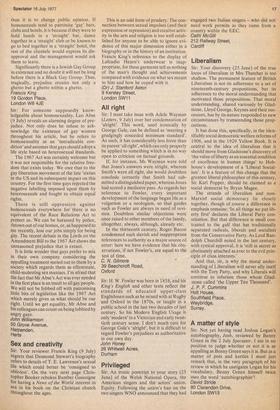All right
Sir: I must take issue with Adele Wayman (Letters, 9 July) over her condemnation of 'alright'. This word, used ironically by George Gale, can be defined as 'meeting a grudgingly conceded minimum standard'. As such, it has considerably less force than its parent 'all right', which can only properly be applied to something which is in no way open to criticism on factual grounds.
If, for instance, Ms Wayman were told that Jones's answers were alright, whereas Smith's were all right, she would doubtless conclude correctly that Smith had submitted a distinguished paper, whereas Jones had scored a mediocre pass. As regards her reference to Fowler, every important development of the language began life as a vulgarism or a neologism, so that guides such as Fowler are always in need of revision. Doubtless similar objections were once raised to other members of the family, altogether, always, although, already etc.
In the thirteenth century, Roger Bacon condemned such slavish and inappropriate references to authority as a major source of error: here we have evidence that his observations, if not Fowler's, are equal to the test of time.
C. N. Gilmore 39 Beechcroft Road, Oxford
Sir: H. W. Fowler was born in 1858, and his King's English and other texts reflect the standards of educated upper-class Englishmen such as he mixed with at Rugby .and Oxford in the 1870s, or taught in a public school in the last two decades of last century. So his Modern English Usage is only 'modern' in a Victorian and early twentieth century sense. I don't much care for George Gale's 'alright', but it is difficult to regard Fowler's prejudices as authoritative in our own day.
John Honey 26 Whitwell Acres, Durham


































 Previous page
Previous page